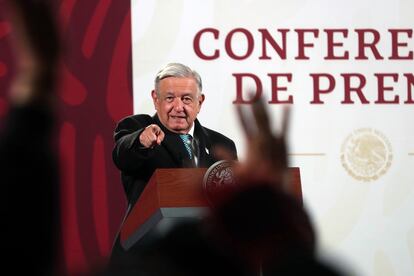Mexico’s president attacks Peruvian government’s state of emergency
After Peru expelled Mexican Ambassador Pablo Monroy for interfering in domestic affairs, López Obrador accused the Andean country of being “undemocratic.” Meanwhile, the family of Pedro Castillo – the jailed former Peruvian president – has been granted asylum in Mexico


President López Obrador has railed against the Peruvian government after the Mexican ambassador was expelled from the Andean country. He accused Peru’s President Dina Boluarte – the first female president in Peruvian history – of “not seeking a way out of the conflict in Peru through dialogue.” He demanded that she and her Congress hold new elections “as soon as possible.”
Tensions between the two countries have escalated in recent days, due to Mexico’s decision to grant asylum to the family of Pedro Castillo, the deposed former Peruvian president. At seven in the morning on Wednesday, December 21, Castillo’s wife and children arrived in Mexico City International Airport. The Mexican ambassador to Peru – Pablo Monroy – has not yet arrived, but he will return home shortly. He was given 72 hours to leave Peru, due to his government’s failure to recognize Dina Boluarte’s authority after she assumed office on December 7. Boluarte – the former vice president – took over after Castillo was impeached and arrested for attempting a coup.
Mexico’s president – an ally of Castillo – has repeated that the Peruvian “elites” prevented Castillo from being able to govern, leading the country into the current political crisis that it now faces.
In any case, the Mexican government has decided not to break relations with Peru, because “the embassy needs to remain open to give protection to the Mexicans who live there,” said López Obrador.
Following protests, blockades and looting in the South of Peru, several Mexican citizens have already left the country. However, others – along with tourists and residents from countries, such as Canada and the United States – still need to have documents processed by diplomatic authorities.
López Obrador – who is seeking to abolish term limits in Mexico, so that he can run for re-election in 2024 – also lashed out at the United States, whose government has recognized Dina Boluarte as the legitimate president of Peru. He lamented that Washington “always talks about democracy… but instead of asking that the will of the people and the democratically-elected president be respected, they have endorsed all the belligerent maneuvers to remove him.”
On the morning of December 7, Castillo – who assumed office in July of 2021 – gave a televised address, in which he announced that he was dissolving Congress and “reorganizing” the judiciary, in order to rule by decree and write a new constitution. However, the army, police, courts and the majority of the population refused to support him – within three hours, he had been impeached by all members of Congress – including his own Marxist “Free Peru” party – and replaced by Boluarte, his vice president.
While en route to the Embassy of Mexico to seek asylum, Castillo was arrested by his own security forces. He is now serving an 18-month-long pre-trial detention for the charge of rebellion, as well as for various corruption charges.
There are still pending questions as to whether this attempted coup was indeed orchestrated by Castillo, or whether the leaders of his party – such as former Junín governor Vladimir Roy Cerrón, or former prime minister Aníbal Torres, both under investigation – spearheaded the attack on Peru’s democratic institutions.
Following Boluarte’s assumption of power – as dictated by the Peruvian constitution – relations with López Obrador’s administration have been tense. She – along with congressional leadership – are unhappy with the president’s statements regarding the situation. The left-wing leaders of Argentina, Colombia and Bolivia – who all supported the deposed Castillo – have also voiced complaints about his impeachment and detention.
López Obrador has always maintained a position of non-interference in the internal affairs of other countries – he has refused to condemn abuses in Venezuela, Cuba or Nicaragua. However, he has made an exception when it comes to Peru, demanding that the country’s leaders advance elections from 2026 to 2023. He has blamed the intransigence on the issue of early elections as being the cause of the pro-Castillo protests taking place in the South of Peru, which have left at least 25 civilians and police dead as of the publication of this article, along with several highways and airport runways blocked.
Following a vote by the Peruvian Congress – with 93 out of 130 legislators voting in favor – early presidential and legislative elections are set to be held in April of 2024.
Tu suscripción se está usando en otro dispositivo
¿Quieres añadir otro usuario a tu suscripción?
Si continúas leyendo en este dispositivo, no se podrá leer en el otro.
FlechaTu suscripción se está usando en otro dispositivo y solo puedes acceder a EL PAÍS desde un dispositivo a la vez.
Si quieres compartir tu cuenta, cambia tu suscripción a la modalidad Premium, así podrás añadir otro usuario. Cada uno accederá con su propia cuenta de email, lo que os permitirá personalizar vuestra experiencia en EL PAÍS.
¿Tienes una suscripción de empresa? Accede aquí para contratar más cuentas.
En el caso de no saber quién está usando tu cuenta, te recomendamos cambiar tu contraseña aquí.
Si decides continuar compartiendo tu cuenta, este mensaje se mostrará en tu dispositivo y en el de la otra persona que está usando tu cuenta de forma indefinida, afectando a tu experiencia de lectura. Puedes consultar aquí los términos y condiciones de la suscripción digital.








































